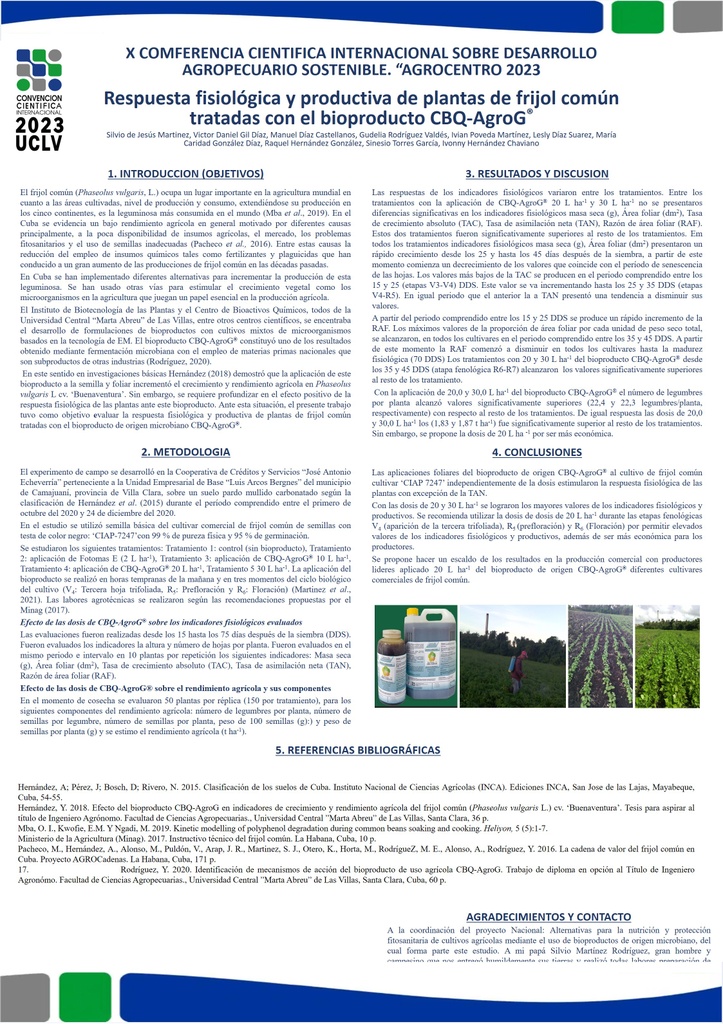Executive Secretary

9th International Scientific Conference on Agricultural Development and Sustainability
10th Symposium of Agronomy

Abstract
Context: In the proof of concept in the field, the application of the CBQ-AgroG® bioproduct to the seed and foliar increased growth in Phaseolus vulgaris L. However, it is necessary to deepen the positive effect of the physiological response of plants to this bioproduct. .
Objective: To evaluate the physiological and productive response of common bean plants treated with the bioproduct of microbial origin CBQ-AgroG®.
Methods: The field experiment was carried out at the "José Antonio Echeverría" Credit and Services Cooperative in the municipality of Camajuaní, Villa Clara province. Three doses of the bioproduct (10, 20 and 30 L ha-1) were studied and compared with an absolute control and a biological control. Physiological indicators were evaluated: dry mass, leaf area, absolute growth rate, net assimilation rate, leaf area ratio, as well as agricultural yield and its components.
Results: The maximum values in the dry mass and leaf area indicators were reached 45 days after sowing, while the rest were achieved between 35 and 45 days after sowing. After sectioning the Net Assimilation Rate, all the physiological and productive indicators with 20 and 30 L ha-1 reached significantly higher values with respect to the rest of the treatments.
Conclusions: The foliar applications of the bioproduct of CBQ-AgroG® origin to the common bean cultivar 'CIAP-7247' stimulated the physiological and productive response of the plants with the exception of the Net Assimilation Rate. The dose of 20 L ha-1 is recommended for the first dose because it is more economical.
Resumen
Contexto: En la prueba de concepto en campo la aplicación del bioproducto CBQ-AgroG® a la semilla y foliar incrementó el crecimiento en Phaseolus vulgars. Sin embargo, se requiere profundizar en el efecto positivo de la respuesta fisiológica de las plantas ante este bioproducto.
Objetivo: Evaluar la respuesta fisiológica y productiva de plantas de frijol común tratadas con el bioproducto de origen microbiano CBQ-AgroG®.
Métodos: Se desarrolló en la Cooperativa de Créditos y Servicios “José Antonio Echeverríaˮ del municipio de Camajuaní, provincia de Villa Clara. Se estudiaron tres dosis del bioproducto (10, 20 y 30 L ha-1), se compararon con un control absoluto y un control biológico. Se evaluaron los indicadores fisiológicos: masa seca, área foliar, tasa absoluta de crecimiento, tasa de asimilación neta, razón de área foliar, asi como el rendimiento agrícola y sus componentes.
Resultados: Los máximos valores en los indicadores masa seca, área foliar se alcanzaron a los 45 días después de la siembra, mientras que el resto lo lograron entre los 35 y 45 días después de la siembra. A excepción la Tasa de Asimilación Neta todos los indicadores fisiológicos y productivos con 20 y 30 L ha-1 alcanzaron valores significativamente superiores con respecto al resto de los tratamientos.
Conclusiones: Las aplicaciones foliares del bioproducto de origen CBQ-AgroG® al cultivo de frijol común cultivar ‘CIAP-7247’ estimularon la respuesta fisiológica y productiva de las plantas con excepción de la Tasa de Asimilación Neta. Se recomienda la dosis de 20 L ha-1 la primera dosis por ser más económica.
About The Speaker

Dr. Silvio de Jesús Martinez Medina

Discussion

